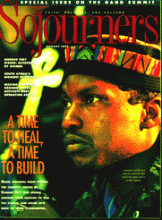Jerry McAfee was a Baptist preacher at New Salem Missionary Baptist Church and worked with gang members through The City Inc. and United for Peace in Minneapolis when this article appeared. Jim Wallis interviewed him at the Gang Summit.
- The Editors
Jim Wallis: A lot of people who don't understand what faith is about will be surprised at the role religion played at this summit.
Jerry McAfee: Of course! We are a spiritual people, and anytime we operate outside of that spirituality we're nothing. We learn especially from a Christian perspective that faith is the substance of things hoped for, and the evidence of things not seen.
My own definition of hope is the earnest expectation of God moving in the future. We see the other side of Jordan, the other side of the Red Sea--and not the circumstances or the water that hinder us from reaching our goal.
Wallis: At critical moments during the summit, when things were tense and tempers were on the edge, you stepped forward with a prayer or a song or a calm presence. You had a pastoral role here.
McAfee: Yeah, for many of these brothers I do. But there is an aura about people who are involved in struggle. Most of them are spiritually oriented people.
Sometimes prayer and song have a tendency to take those emotions down. And I just feel moved by the Spirit. If we don't do it now, emotions will carry us to a place we don't need to be. I don't think anyone would intentionally want that to happen, but our people are so locked up and hurting.
Wallis: What do you think comes out of this summit?
Read the Full Article

